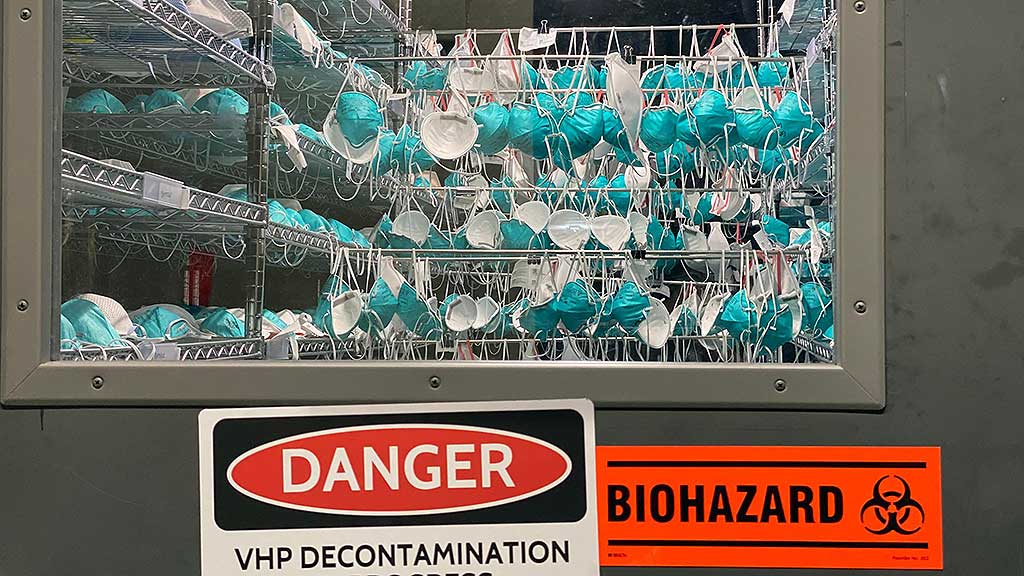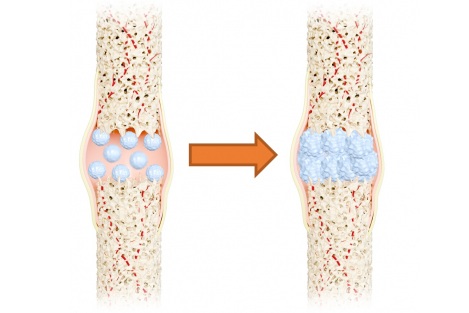Decontamination May Damage N95 Face Masks' Integrity
|
By HospiMedica International staff writers Posted on 27 Jul 2020 |

Image: The Battelle’s VHP N95 mask decontamination system (Photo courtesy of Battelle)
A new study suggests that some N95 respirator sterilization techniques can damage their protective function.
Researchers at the University of Massachusetts (UMASS; Amherst, USA), New England Baptist Hospital (Boston, MA, USA), and other institutions conducted a study to examine the impact of various sterilization techniques that were authorized for emergency use by the U.S. Food and Drug Administration (FDA), in light of the current shortage of medical N95 respirators. State-of-the-art pollution detection instruments and a mannequin head were used to measure whether microscopic particles can pass through the masks after they are sterilized.
The results showed that N95 respirators decontaminated between one and 10 times with vaporized hydrogen peroxide (vHP), or up to five times with shorter decontamination cycles of gas plasma hydrogen peroxide (gpHP) sterilizers retained their original filtration capabilities. But using ultraviolent (UV) germicidal irradiance (UVGI) slowly diminished filtration efficiency, reaching a compromised level following nine repeated treatments. Immersing a N95 mask in a 10% bleach solution also degraded its performance. The study was published on July 16, 2020, in Infection Control and Hospital Epidemiology.
“Given the global N95 shortages, clinicians face a choice: wearing a used, and potentially infected respirator, or wearing one that was decontaminated through a process that may affect the integrity of the respirator,” said lead author Richard Peltier, PhD, MPH, of the UMASS school of public health and health sciences. “Some treatments for decontamination had no impact on respirator performance, while other treatments resulted in substantial damage to masks.”
The researchers noted that the study did not address the masks' fit or general integrity, including elastic function, corrosion on staples, and compression of the respirator, all of which are important for proper functioning.
Related Links:
University of Massachusetts
New England Baptist Hospital
Researchers at the University of Massachusetts (UMASS; Amherst, USA), New England Baptist Hospital (Boston, MA, USA), and other institutions conducted a study to examine the impact of various sterilization techniques that were authorized for emergency use by the U.S. Food and Drug Administration (FDA), in light of the current shortage of medical N95 respirators. State-of-the-art pollution detection instruments and a mannequin head were used to measure whether microscopic particles can pass through the masks after they are sterilized.
The results showed that N95 respirators decontaminated between one and 10 times with vaporized hydrogen peroxide (vHP), or up to five times with shorter decontamination cycles of gas plasma hydrogen peroxide (gpHP) sterilizers retained their original filtration capabilities. But using ultraviolent (UV) germicidal irradiance (UVGI) slowly diminished filtration efficiency, reaching a compromised level following nine repeated treatments. Immersing a N95 mask in a 10% bleach solution also degraded its performance. The study was published on July 16, 2020, in Infection Control and Hospital Epidemiology.
“Given the global N95 shortages, clinicians face a choice: wearing a used, and potentially infected respirator, or wearing one that was decontaminated through a process that may affect the integrity of the respirator,” said lead author Richard Peltier, PhD, MPH, of the UMASS school of public health and health sciences. “Some treatments for decontamination had no impact on respirator performance, while other treatments resulted in substantial damage to masks.”
The researchers noted that the study did not address the masks' fit or general integrity, including elastic function, corrosion on staples, and compression of the respirator, all of which are important for proper functioning.
Related Links:
University of Massachusetts
New England Baptist Hospital
Latest Critical Care News
- Origami Robots to Deliver Medicine Less Invasively and More Effectively
- Improved Cough-Detection Technology Aids Health Monitoring
- AI Identifies Children in ER Likely to Develop Sepsis Within 48 Hours
- New Radiofrequency Therapy Slows Glioblastoma Growth
- Battery-Free Wireless Multi-Sensing Platform Revolutionizes Pressure Injury Detection
- Multimodal AI to Revolutionize Cardiovascular Disease Diagnosis and Treatment
- AI System Reveals Hidden Diagnostic Patterns in Electronic Health Records
- Highly Sensitive On-Skin Sensing Monitor Detects Vitamin B6 and Glucose in Sweat
- Artificial Intelligence Revolutionizing Pediatric Anesthesia Management
- New Device Detects Tuberculosis DNA Directly in Exhaled Air
- New Menstrual Cup Could Detect Infections and Improve Diagnostics
- Engineered “Natural Killer” Cells Could Help Fight Cancer
- Faster Lymph Flow Predicts Better Response to Diuretics in Acute Heart Failure
- New Global Recommendations Aim to End Deaths from Postpartum Hemorrhage
- 'Flat-Line ECG' Indicates Poor Outcomes for Out-Of-Hospital Cardiac Arrest
- New Guidance to Improve Diagnosis and Management of Heart Failure During Pregnancy and Postpartum
Channels
Surgical Techniques
view channel
Novel Glue Prevents Complications After Breast Cancer Surgery
Seroma and prolonged lymphorrhea are among the most common complications following axillary lymphadenectomy in breast cancer patients. These postoperative issues can delay recovery and postpone the start... Read more
Breakthrough Brain Implant Enables Safer and More Precise Drug Delivery
Delivering medication directly to specific regions of the brain has long been a major challenge in treating neurological disorders. Current implants and infusion systems typically reach only one or two... Read morePatient Care
view channel
Revolutionary Automatic IV-Line Flushing Device to Enhance Infusion Care
More than 80% of in-hospital patients receive intravenous (IV) therapy. Every dose of IV medicine delivered in a small volume (<250 mL) infusion bag should be followed by subsequent flushing to ensure... Read more
VR Training Tool Combats Contamination of Portable Medical Equipment
Healthcare-associated infections (HAIs) impact one in every 31 patients, cause nearly 100,000 deaths each year, and cost USD 28.4 billion in direct medical expenses. Notably, up to 75% of these infections... Read more
Portable Biosensor Platform to Reduce Hospital-Acquired Infections
Approximately 4 million patients in the European Union acquire healthcare-associated infections (HAIs) or nosocomial infections each year, with around 37,000 deaths directly resulting from these infections,... Read moreFirst-Of-Its-Kind Portable Germicidal Light Technology Disinfects High-Touch Clinical Surfaces in Seconds
Reducing healthcare-acquired infections (HAIs) remains a pressing issue within global healthcare systems. In the United States alone, 1.7 million patients contract HAIs annually, leading to approximately... Read moreHealth IT
view channel
Printable Molecule-Selective Nanoparticles Enable Mass Production of Wearable Biosensors
The future of medicine is likely to focus on the personalization of healthcare—understanding exactly what an individual requires and delivering the appropriate combination of nutrients, metabolites, and... Read moreBusiness
view channel
Philips and Masimo Partner to Advance Patient Monitoring Measurement Technologies
Royal Philips (Amsterdam, Netherlands) and Masimo (Irvine, California, USA) have renewed their multi-year strategic collaboration, combining Philips’ expertise in patient monitoring with Masimo’s noninvasive... Read more
B. Braun Acquires Digital Microsurgery Company True Digital Surgery
The high-end microsurgery market in neurosurgery, spine, and ENT is undergoing a significant transformation. Traditional analog microscopes are giving way to digital exoscopes, which provide improved visualization,... Read more
CMEF 2025 to Promote Holistic and High-Quality Development of Medical and Health Industry
The 92nd China International Medical Equipment Fair (CMEF 2025) Autumn Exhibition is scheduled to be held from September 26 to 29 at the China Import and Export Fair Complex (Canton Fair Complex) in Guangzhou.... Read more














